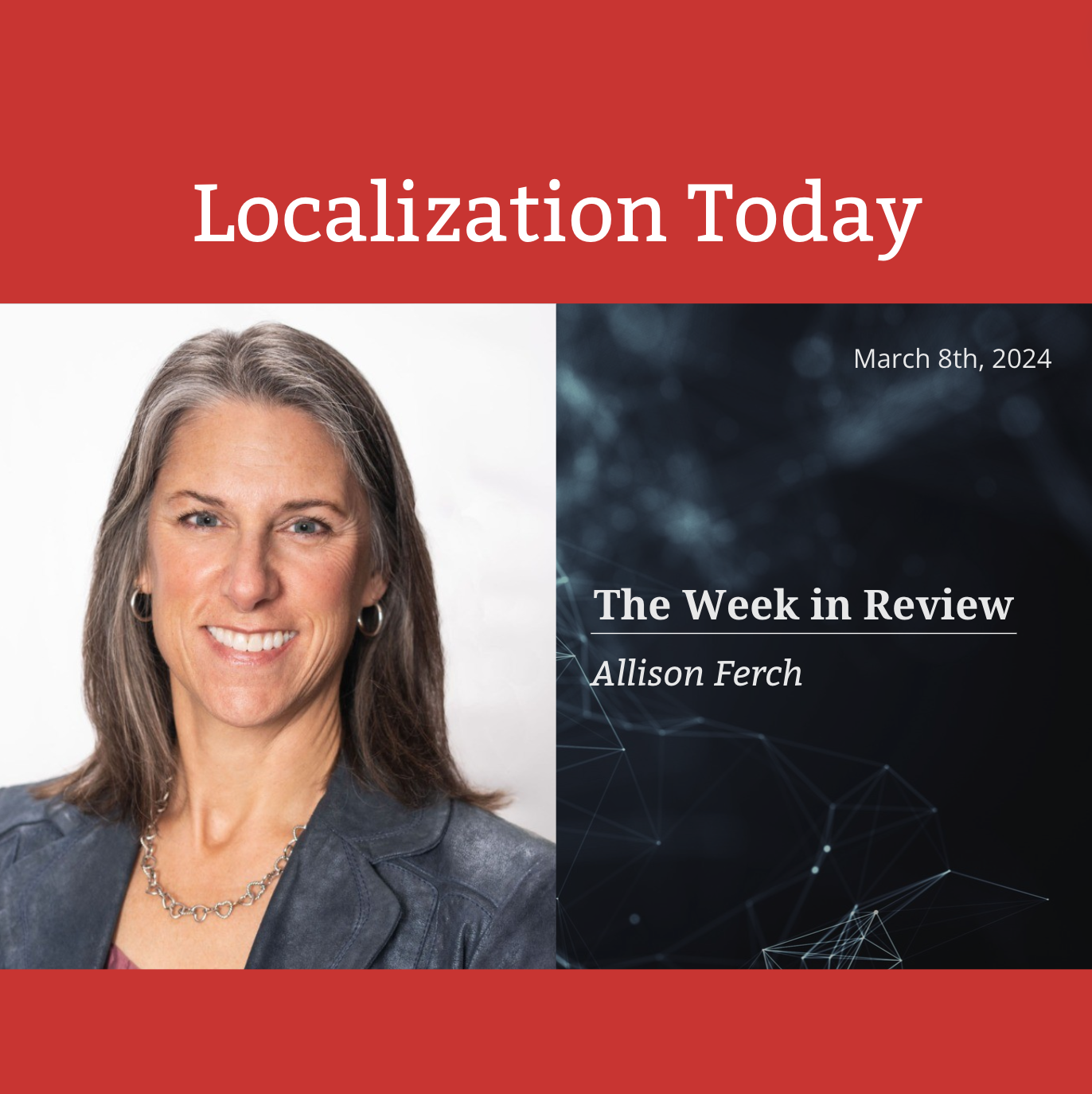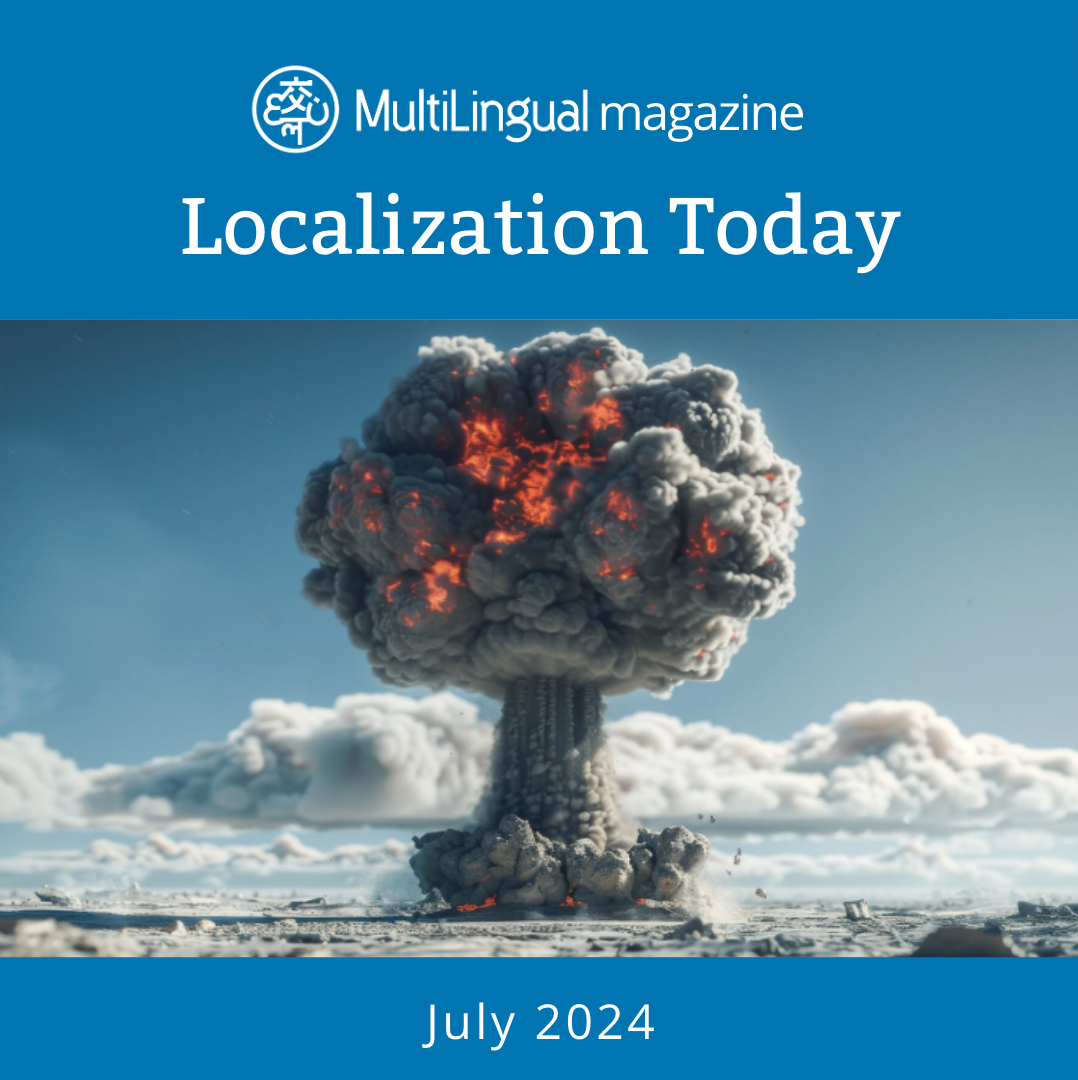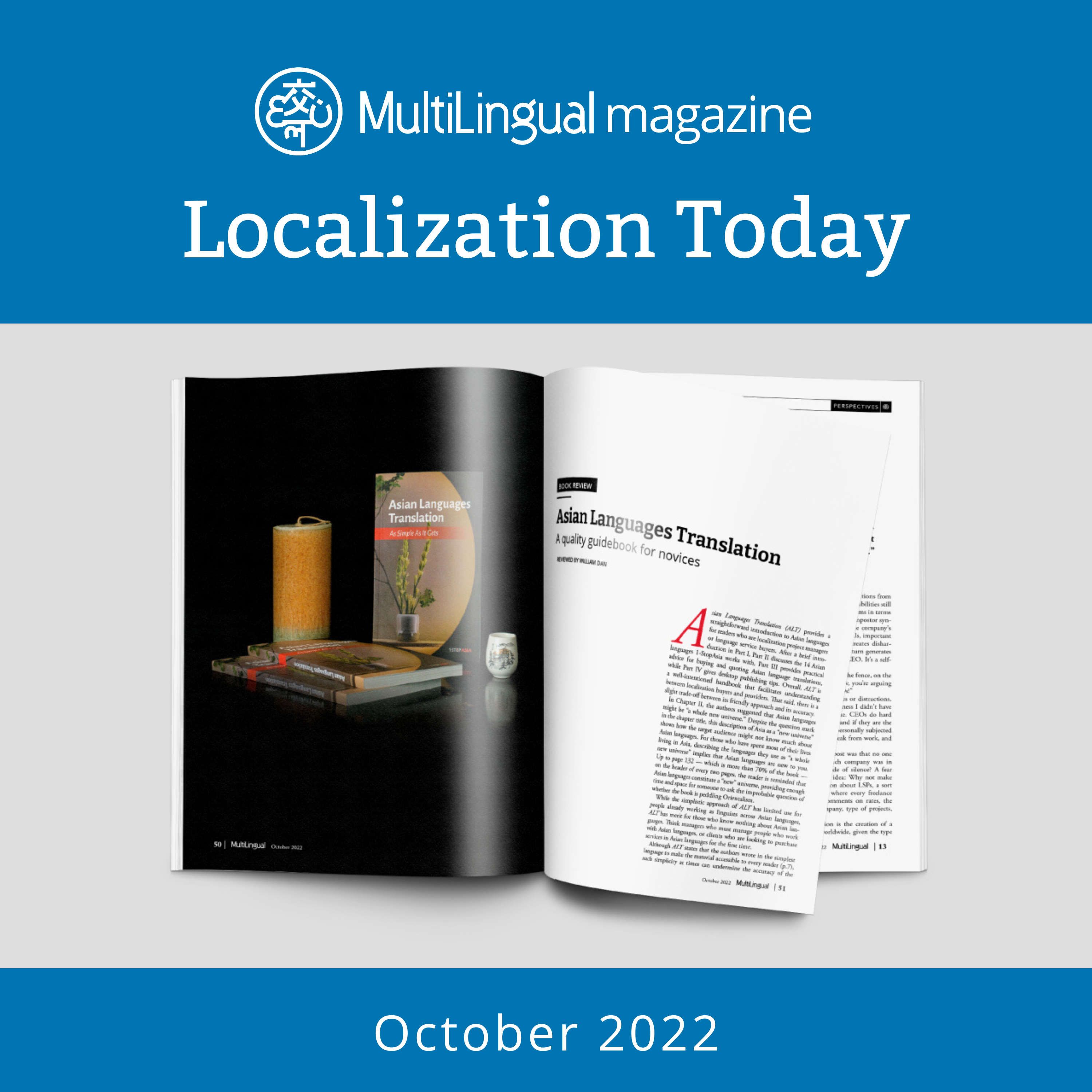Episode Transcript
[00:00:05] Speaker A: The following is our conversation with Anna Rita DeBonis, Ph.D. candidate in Intercultural Relations and International Management at the Universidad de Glistuti Internationali di Roma, and Amanda Alvarado, solutions consultant at Artable Us.
This was an amazing conversation where we challenge ourselves to understand more about accessibility and what we can do to make our world a more accessible world for those that don't find it as easy as everyone else.
My name is Eddie Arrieta, CEO at Multilingual Magazine.
Enjoy.
[00:00:47] Speaker B: As the localization industry, we need to take a step back and kind of broaden our view on content. So we really should be thinking of content as a whole and, you know, being able to make it universally inclusive. And what I mean when I say that is that your content, whether it's for your employees or your end users, for your learners, your customers, it's the message resonates and they can engage with your content, no matter the locale, the language or ability.
And at rws, what we're doing is we're kind of addressing this in two ways. The first way would be around the actual content. So your digital platform, your documentation, your video, or any of that, the content that a company creates and making sure that it's compliant to all of the legislations that are coming out, all of the standards that if you're in this space you understand are continuously changing and really helping companies be compliant and then also take that a step further and be truly accessible and usable. The other way that we're helping our customers address accessibility is through our technology. So, and this is where Annarita has been really helpful for us. So we have a technology stack that maybe you're familiar with, I hope you're familiar with. So Trados language, Weaver and Tridian. And Annarita has been helping us to not only make Trados compliant, so what we look at is something called WCAG or WCAG or there's different ways people say it, but WCAG 2.1 level AA compliant. And really this is a universal standard that many legislations and regulations are either in parallel with or derivative of. So we're looking at making all of our products and compliant with this. And not only that, annarita is helping us to take this a step further and make it actually usable.
[00:03:00] Speaker C: I'm blind. I'm totally blind and I graduated in. I have a master's degree in translation and interpreting and I'm currently doing a PhD and so for me it's really important.
Accessibility is really crucial because of course, for personal reasons, because, yeah, as I mentioned, I am totally blind. And of course it's important for me that I can use all the available tools as my peers, as my other translators or other colleagues do. So yeah, and of course this is why I'm so passionate and dedicated to accessibility in this field. I started in AWS because as I mentioned, personal reasons. I mean, when I was doing my master's degree, I had to use Trado Studio, but it was not accessible. So for this reason it was really difficult for me to pass this exam.
But my teacher, my professor was really helpful and was dedicated to, was sensitive about accessibility and of course she helped me so I could really learn how to use Krados even though it was not accessible.
Of course I was not able to use on my own, but I could for example, tell my, say my colleagues, please press this button or do that other things. And I mean, with the help of my colleagues and my professor, I could really understand how this CAT tool could be used. And then when I completed my master's degree, I was a little bit giving up to the profession of the translator.
But then in 2021, I did apprenticeship at the General Secretariat of the Council of the European Union in the Italian Translation unit. And of course they were using Trados and I couldn't really enjoy completely and fully enjoy this experience because of course Trados was not accessible and of course I could translate by using Word and with the help of my colleagues that were importing my translation into Trados. But of course the experience was not exactly the same as my colleague. So yeah, it was a little bit frustrating. And then after this traineeship, I had the opportunity to be selected for a scholarship of a PhD.
Of course my project is focusing on the accessibility of Trado Studio. So then I started to, thanks to this PhD, I started to collaborate with RWS. I did an internship, a one year internship with RWS. And then after that I was involved in a nine month project financed by the RWS Foundation.
And at the end of this project, I mean, I was cooperating close with the developers and I was testing the software to provide solutions to make it more accessible and usable. And after that project came to an end, I was full time employed in aws. And this is something that I'm really proud of.
[00:08:13] Speaker B: I think, you know, just as with everyone else in our industry, accessibility is becoming more and more of a hot topic. And I think there's a couple of reasons for this. One reason, and the most important reason is people. So, you know, there's 1.6 or 1.7 billion people who identify as having Some sort of disability, whether that's hearing, visual, cognitive, mobility.
And so, you know, we really want to be sure that we're enabling our full audience to engage with content.
Another reason is that we're starting to see more and more, as I mentioned, legislation coming out. There is something called the European Accessibility act that comes into force June of next year. And this actually is a landmark legislation because it affects private companies. So historically, what you've seen is that public companies are the ones who really had to comply with accessible standards. But now we're seeing this come into private companies as well. And there's teeth behind these legislations, there's penalties behind it. So you're seeing more and more companies sit up and take notice. So that's another thing that's driving accessibility in the industry as well. And then the third reason would be company profile, basically, right? So boosting your company profile, showing that you're doing the right thing and driving innovation. So what's really interesting, they liken it to the electronic curb cut effect, right? So if there's a sidewalk outside and you know, there's been. They call it a curb cut for wheelchairs, right? Most people are familiar with this and it's a dip in the sidewalk. But there's what they've noticed and they've done studies that most people will go out of their way to use this curb cut. So this would be people on bikes, people pushing strollers, people on skateboards, people with travel bags. And although these curve cuts were originally created for wheelchairs, 9 out of 10 times people go out of their way to use these. The same thing happens in the digital space and the content space as well. When you give people options to make their lives easier, accessibility really supports everyone. And you see a lot of the technologies or the solutions that were designed for somebody with a disability. Now actually, you know, mainstream, everybody's using it, right? Things like text to speech, or.
[00:10:52] Speaker C: Trying.
[00:10:53] Speaker B: To think of some others off the top of my head. But, you know, being able to darken your screen, different things like that. And then you also have people who have situational limitations. So, you know, at the time, if I break my arm, I have the same mobility need as somebody who maybe is missing an arm. Now, it's, it's temporary, but I have the same need for support and for options so that I can get my work done or engage in content. So these are some of the reasons that we're seeing accessibility become more and more of a topic that you're hearing around. And it's a very important One.
[00:11:34] Speaker C: We will talk about some legislation that, I mean, that will, for example, the European Accessibility act that in June 2025 will be compliant.
[00:11:58] Speaker B: Yeah, absolutely. So we're having a panel discussion with Anna. Rita will be on the panel along with accessibility expert from Google and a localization expert from Dell. And we're going to be talking about, as Annarita mentioned, some of the legislations that's coming, giving people a heads up, also talking about how we have, what we've been talking about, how the market is changing, how the industry is changing and what this new landscape means for localization groups for different organizations, and then also some tangible pragmatic steps to start your accessibility journey. It's very interesting how to meet localization and accessibility really do go hand in hand. Right. When you design with localization and accessibility in mind upstream in a process, it saves time, it saves money, and it ensures that all of your consumers or employees can really engage with your content and no one is left out, right?
[00:13:05] Speaker C: Yeah, I think that raise awareness it the big goal that we can reach because for example, there are people that maybe are not aware of how much important is accessibility.
And so I think that the goal is really to raise awareness of how important accessibility is. And yes, of course, we want to give an idea, at least an idea of, of what has been done and what is still to be done. So I think that these are the main goals. I mean the ideal world would be a world where of course everything is accessible and that every person can use the product that and tool that he or she wants. And yeah, of course. And really Utopia would be, yeah, it's really accessibility everywhere and that people really consider it as an important, an important topic.
[00:14:35] Speaker B: Yeah, I, you know, I think a key word for me here is independence, right? Being able to do your job, being able to consume content, engage with the brand, go shopping independently. And I think to me that would be the ideal world is everyone, you know, we have a mindset upfront when we're thinking about designing content or designing technologies or platforms that really we take a step back and think, okay, how can we ensure that everyone around the globe can independently access what we're trying to create? And to me that would be the ideal mind frame, the ideal, I think outcome for these talks in the long run. Another interesting thing, if I can with Annarita, when I was speaking with Annarita, we've talked about making products accessible and not just compliant, but truly accessible and usable. But there's another step to this as well that a lot of companies and people forget and that is all the auxiliary things around the product. So even if, for example, we get Trados to be completely accessible, what about the onboarding? What about the training? What about the documentation?
What about IT support? Is your IT support trained to be able to support somebody like Annarita who's blind? So, you know, if she has an issue and she calls up for IT support and it says, oh, you know, there's a box in the top right corner that's not usable information for Anna Rita. So making sure that everyone around the organization is truly trained on and has the mindset of accessibility so that they can support their users and support anyone trying to use their product.
[00:16:27] Speaker C: Of course, I think that I already did quite a lot, but of course I will be continuing working in the field of accessibility and to raise awareness. And of course my hope is that, for example, a blind person, a blind translator can independently do his or her job, his profession, I mean, can translate as other translators, other translators do. Because for example, now blind translators are not able to compete with sighted translators because of course as a blind translator we can, for example, translate by using word or whatever or maybe also, I don't know, another CAT tool that is specifically designed for blind people. But of course the quality of the translation may completely differ and because of course we can't really be efficient and I mean even the translation maybe can't have this high quality that agencies and I mean that this profession requires. Because of course we have to be, I mean, hand to hand with technology. And for example, technology is really important for us and really change maybe in some way our lives, especially for blind users, because technology is really helpful. But in this case technology became a barrier. So hopefully that in the next future we will be able to translate as other, I mean as every translator.
[00:18:47] Speaker B: Take advantage of feature rich products and the efficiencies that they offer. I think so I think right now, you know, the takeaways that are important for me for this conversation is to again, really raise awareness and then take that a step further and actually start doing something, something about it. And I think we have great people here who, you know, listen to the multilingual podcast, who are at LOK World, who really can take this conversation to the next level and really start designing products and services that will enable people like Anna Rita or others to be able to enjoy some of the things we take for granted every day.
[00:19:42] Speaker C: I think that it's really important, as Amanda said, now raise awareness. And even for example, people have the opportunity to choose the product to use the service, the tool And a blind user sometimes is obliged to use that product rather than another one, just because, for example, that product is accessible and the other product isn't accessible. So I think that if every tool and every service and every product will be accessible, we will not be obliged to choose. And we can really make our choice, really, I mean, as other, I mean, as our peers do so preference as.
[00:20:39] Speaker B: Opposed to that the only choice, one of the beginning ones.
So at rws, if I can, I think it was the first one. So at rw, like kind of at rws, what are you guys doing around accessibility? And so, so at rws, we were really passionate about accessibility and we really want to help our customers on their accessibility journey. And we're doing this in kind of two ways. The first way is through content and content services.
And so when you think of content and creating things like documentation, digital platforms, videos, anything like that, being able to help our customers remediate, to fill any gaps and make sure that their content is accessible, no matter who is trying to engage with it. And then in parallel to that, we're also looking at the products that we offer. So Trados, Language, Weaver, Tritian, and making them accessible as well. And so one product, Trados, that we're really focused on right now, especially with Anna Rita, is bringing that beyond compliance. So Trados has been compliant for several years now. When we talk about accessibility standards, however, we're really devoted to making sure that it's usable and that translators around the world or people in the localization industry around the world can use this product and gain the efficiencies that any of the other users can as well. So one thing I wanted to mention, since we're in a multilingual environment right here, is just because something is accessible in English doesn't mean that it's inherently accessible in other languages. So it's really important to make sure that you're testing or designing with those target markets in mind as well.
[00:22:53] Speaker A: And this was our conversation with Anna Rita DeBonis, Ph.D. candidate in Intercultural Relations and International Management from the Universitad de Glistuti Internationali di Rome, and Amanda Alvarado, solutions consultant at R. Davos. My name is Eddie Arrieta from Multilingual Magazine. Thanks for listening.


